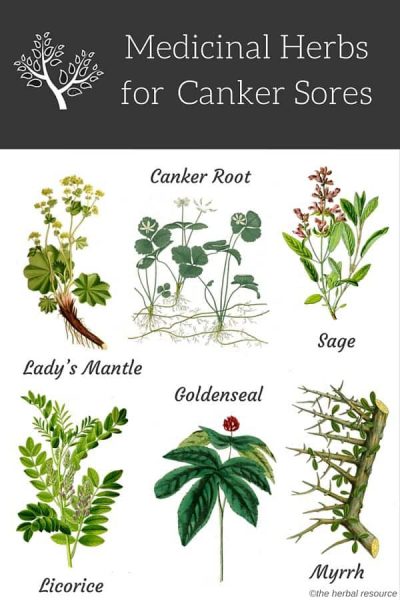The conventional treatment for canker sores often involves medications that help relieve pain and inflammation, such as antibiotics or corticosteroids.
Doctors often recommend ice to alleviate the pain and rinsing the mouth with warm salt water several times a day.
It is also generally recommended to eliminate those things which can trigger or aggravate canker sores, such as alcohol, chewing gum, citrus fruits, coffee, dairy products, meat, pineapple, spicy foods, tomatoes, toothpaste and vinegar, and other acid foods.
Certain supplements can be helpful which will specifically address the canker sores. Lysine is an amino acid that has been shown to be deficient in some individuals when canker sores appear.
Vitamin B complex is also recommended, as people who get canker sores often show low levels of B vitamins in their bodies.
Strengthening the body’s immune system is also an excellent way to prevent the sores. Vitamin C is helpful in healing the mouth’s mucous membranes and also is a natural immune booster.
Zinc is an essential mineral that is also known to be a useful support for the immune system.
Mouth sores may be caused by a bacterium, a fungus, a virus or an allergy. There are several herbs which are useful in the treatment of canker sores.
Many of the herbs traditionally used contain tannin (the common name for tannic acid) and other wound-healing properties.
Tannic acid is antiseptic with a broad-spectrum antibacterial and anti-viral action which gives foods an astringent taste.
It is especially helpful for treating inflammations of the mouth, gums, and throat. Other herbal remedies support the immune system or are helpful in relieving the pain associated with canker sores.
Herbal remedies may offer significant relief of symptoms associated with canker sores, and support the body’s healing.
However, it is important to see a doctor if canker sores persist or recur because they can be a symptom of more serious conditions such as celiac disease, Behcet’s syndrome, inflammatory bowel disease, and squamous cell carcinoma.
Medicinal Herbs for Canker Sores Treatment
Myrrh
Myrrh (Commiphora molmol, Commiphora abbysinica, Commiphora myrrha) has a long history as an herbal treatment for wounds as well as mouth and gum inflammations.
Germany’s Commission E., the body of scientists that provides advice on herbal remedies, has endorsed myrrh for the treatment of mild inflammations of the gums, mouth, and throat due to its high amount of tannins.
Canker Root
Canker root (Coptis groenlandica), also known as goldthread, is traditionally used as an herbal remedy for canker sores, sore throat, and fever blisters.
Goldenseal
Goldenseal (Hydrastis canadensis) is used in the treatment of all kinds of wounds. Its constituents are astringent and antiseptic, which can be useful in the treatment of wounds and infections including canker sores.
Echinacea
Echinacea (Echinacea angustifolia, Echinacea purpurea) has antiviral, immune-enhancing properties which make it an effective herbal treatment for mouth sores as well as general wound healing.
Licorice
Licorice (Glycyrrhiza glabra) contains tannin and other compounds that help speed the healing of wounds.
It is expectorant, demulcent, anti-inflammatory, adrenal agent, antispasmodic and a mild laxative. It may be used in combination with other herbal teas to sweeten the mixture.
In one study, a mouthwash containing licorice provided relief from canker sores in 75% of the people who used it. Participants in the study noted substantial relief within one day and complete healing by the third day.
Sage
The healing actions of sage (Salvia officinalis) are carminative, spasmolytic, antiseptic, astringent and anti-hidrotic.
Sage is the classic remedy for inflammations of the mouth, throat, and tonsils. Many herbalists recommend using strong sage tea as a gargle for the treatment of inflammations of the mouth and throat and inflamed bleeding gums.
As a gargle for mouth and throat conditions, it combines well with tormentil (Potentilla tormentilla) and balm of gilead (Populus gileadensis).
Wild Geranium
Wild Geranium (Geranium maculatum), also known as cranesbill, is a traditional herb used as a treatment to stop the bleeding of open wounds and as a wash for canker sores.
It is rich in tannins which provide its astringent qualities.
German Chamomile
German chamomile (Matricaria chamomilla) has been used for thousands of years to treat a wide variety of conditions.
Its actions are anti-spasmodic, carminative, anti-inflammatory, analgesic, antiseptic and vulnerary.
It is used as a natural treatment for the pain of canker sores, as it has a soothing effect on mucous membranes. Its natural healing properties make it a good choice as a treatment for mouth sores.
Aloe Vera
Aloe vera is used in traditional Ayurvedic medicine to treat canker sores.
A preliminary study has shown that a mouthwash of aloe vera juice could be an effective treatment for mouth sores.
In one double-blind trial, a topical gel containing the aloe polysaccharide acemannon was found to speed the healing of canker sores better than conventional treatment.
The actions of aloe are cathartic, vulnerary, and emmenagogue.
Lady’s Mantle
Lady’s mantle (Alchemilla vulgaris) is astringent, diuretic, anti-inflammatory, emmenagogue, and vulnerary.
It is a traditional herbal remedy for mouth and throat infections, as well as menopausal ailments, painful menstrual periods and skin rashes.
One preliminary study using a 3% extract of lady’s mantle relieved discomfort and healed canker sores within three days for 75% of people in the study, compared with 40% who used conventional treatments and 33% who used no treatment.
Other Herbs Used for Canker Sores
- Agrimony (Agrimonia Eupatoria)
- Alfalfa (Medicago sativa)
- Bearberry (Arctostaphylos Uva-Ursi)
- Burdock(Arctium lappa)
- Cayenne Pepper (Capsicum annum or Capisicum frutescens)
- Comfrey(Symphytum officinale)
- Cranes Bill (Geranium maculatum)
- Eucalyptus(Eucalyptus globulus)
- Pau d’ Arco (Tabebuia impetiginosa)
- Peppermint(Mentha piperita)
- Red Clover (Trifolium pratense)
- Red Raspberry (Rubus idaeus, Rubus strigosus)
- Frostwort (Helianthemum Canadense)
- St. John’s wort (Hypericum perforatum)
- Tea Tree Oil (Melaleuca alternifolia)
- Wintergreen (Gaultheria procumbens)
- Witch Hazel (Hamamelis virginiana)
- Wild Strawberry (Fragaria vesca)
Thordur Sturluson
Latest posts by Thordur Sturluson (see all)
- What is the Difference Between Hemp and Marijuana? - June 3, 2019

Leave a Reply